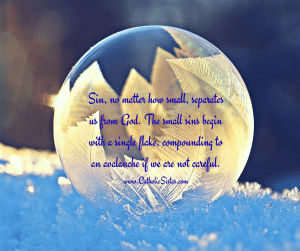During a homily a couple years ago, the chaplain at the time shared a quote based on Pope Saint John XXIII’s Coat of Arms. The quote said, “See everything, overlook a great deal, correct a little.” At the time, this quote gave me the gentle reminder that it was okay to observe, and just as okay to hold my tongue. It was a powerful reminder that, while a spiritual work of mercy is to Instruct the Ignorant, instruction may not even require words and instead could take the form of modeling by our actions.
However, seeing everything, overlooking a great deal, and correcting little does not give us a green light to overlook our own thoughts, actions and words. As St. Teresa of Avila is credited with saying, “Be gentle to all and stern with yourself.”

In today’s culture, there seems to be an emphasis on pointing out another person’s faults, and finger pointing, instead of taking some thought to account for individual actions. The tendency to blame others, and the ease of getting away with blaming others, has led to a culture in which introspection is on the decline. Add in a lack of catechesis, we are seeing Catholics struggle with the Sacrament of Reconciliation, choosing to stand adamantly against the notion of confessing “to a man.”
Combine those with an attitude of only serious crimes (i.e. murder or robbery) being sins, there appears to be a serious lack of accountability…
…and, lack of the recognition of the severity of our sins.
Sins simply aren’t considered polite conversation. However, at times in our lives, we should be challenged to squirm in our seats.
We should be willing to face our own reflection in the mirror, and thoroughly examine what we have done in our days…
… and even more uncomfortably, what we may have failed to do.
Sin, no matter how small, separates us from God. They start small, with a nudge to perhaps sleep in a little bit one week, then the next, then the next – until it becomes an exception to the rule to actually go to church.
1 Corinthians 6:9-11 states, “Do you not know that wrongdoers will not inherit the kingdom of God? Do not be deceived! Fornicators, idolaters, adulterers, male prostitutes, sodomites, thieves, the greedy, drunkards, revilers, robbers – none of these will inherit the kingdom of God. And this is what some of you used to be. But you were washed, you were sanctified, you were justified in the name of the Lord Jesus Christ and in the spirit of our God.
The small sins snowball – starting from a single flake, compounding to an avalanche if we are not careful. We begin to be dismissive of the little things, placating ourselves with a mantra, “At least I haven’t done…”
With that seemingly small statement builds the roots of one of the deadly sins – pride.
Fr. Juan Jose Gallego, an exorcist from the Archdiocese of Barcelona once explained the devil’s favorite sin is pride. When we try to justify our thoughts, actions, or behavior, instead of simply holding ourselves accountable, we are weakening our connection with God. We are telling God we are disinterested in being transformed by His grace, mercy, and love.

Sin is an uncomfortable subject.
Based on human nature, sin is an uncomfortable truth.
Yet, if we are truly being nourished by God’s word, and allowing the Church to guide us into a deeper relationship with our Creator, we will begin to be able to look sin in the face. While we won’t be perfect, we will have the grace to seek forgiveness for the times we slip, with a truly contrite heart, intent on strengthening our bond with God.
While we should continue to observe everything, overlook a great deal, and correct little in others, we will be able to be gentle toward them, but stern with ourselves.
If we focus on our actions, our behavior, our thoughts, and are truly introspective, we will be able to dig out the roots of pride and emulate the tax collector in Luke 18:13, saying, “God, be merciful to me, a sinner.”
Therefore, let us take some time to stop pointing fingers. Let us stop justifying our actions. Instead, let us spend some time truly sitting and reflecting on our individual relationship with God, celebrating our successes, but more importantly, acknowledging the moments we have created tension in that most loving and sacred relationship in our lives – with God.
And, let us seek God’s forgiveness – allowing our souls the reward of knowing they are forgiven through the Sacrament of Confession, and allowing our human nature to be transformed through the sage wisdom of our priests, as they are guided by Christ Himself in the confessional.
Perhaps the most uncomfortable truth is, we can’t save ourselves on our own – we must be willing to reach out, run to embrace the outstretched arms of our Savior, and allow Him to transform our lives. Allow Him to save us – today, and every day.

